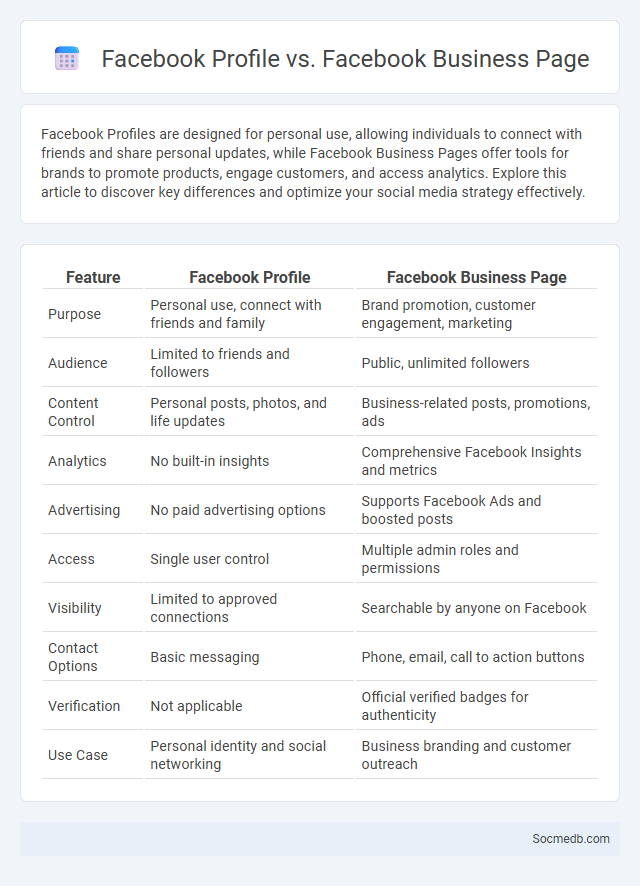
Photo illustration: Facebook Profile vs Facebook Business Page
Facebook Profiles are designed for personal use, allowing individuals to connect with friends and share personal updates, while Facebook Business Pages offer tools for brands to promote products, engage customers, and access analytics. Explore this article to discover key differences and optimize your social media strategy effectively.
Table of Comparison
| Feature | Facebook Profile | Facebook Business Page |
|---|---|---|
| Purpose | Personal use, connect with friends and family | Brand promotion, customer engagement, marketing |
| Audience | Limited to friends and followers | Public, unlimited followers |
| Content Control | Personal posts, photos, and life updates | Business-related posts, promotions, ads |
| Analytics | No built-in insights | Comprehensive Facebook Insights and metrics |
| Advertising | No paid advertising options | Supports Facebook Ads and boosted posts |
| Access | Single user control | Multiple admin roles and permissions |
| Visibility | Limited to approved connections | Searchable by anyone on Facebook |
| Contact Options | Basic messaging | Phone, email, call to action buttons |
| Verification | Not applicable | Official verified badges for authenticity |
| Use Case | Personal identity and social networking | Business branding and customer outreach |
Understanding Facebook Profiles: Core Features
Facebook profiles include essential features such as your timeline, which showcases your posts and life events, and the About section, where you share personal details like work, education, and contact information. Profile pictures and cover photos visually represent your identity, while Friends and Followers lists reveal your social connections. You can customize privacy settings to control who sees your information, ensuring your profile aligns with your desired level of sharing.
What is a Facebook Business Page?
A Facebook Business Page is a dedicated profile designed specifically for brands, businesses, and organizations to connect with their audience on the platform. It enables businesses to showcase products, share updates, run targeted advertising campaigns, and engage with customers through comments and messages. Your Facebook Business Page acts as a digital storefront, enhancing online presence and driving customer interaction efficiently.
Profile vs Business Page: Key Differences
A social media profile represents an individual user with personal information and limited branding options, while a business page is designed for organizations, offering advanced marketing tools, analytics, and advertising features. Business pages enable multiple administrators and provide insights into audience engagement, essential for strategic growth. Profiles prioritize personal connections, whereas business pages focus on brand visibility and customer interaction.
Who Should Use a Facebook Profile?
Individuals seeking to connect with friends, family, and professional contacts benefit from using a Facebook profile due to its extensive networking features. Small business owners and entrepreneurs leverage Facebook profiles to promote their brands and engage directly with customers through targeted content and community interaction. Users interested in joining interest-based groups and accessing personalized news feeds find Facebook profiles essential for tailored social media experiences.
Advantages of a Facebook Business Page
A Facebook Business Page offers enhanced visibility by connecting Your brand directly with over 2.9 billion monthly active users, boosting customer engagement through targeted posts and interactive features. It provides valuable analytics tools that help track user behavior, optimize marketing strategies, and measure campaign effectiveness in real time. Leveraging Facebook's advertising platform allows precise targeting based on demographics, interests, and behaviors, maximizing your return on investment.
Limitations of Facebook Profiles for Businesses
Facebook profiles limit your business by restricting branding options and professional presentation, as they are designed for personal use rather than commercial purposes. They offer limited analytics and advertising tools compared to Facebook Pages, hindering effective audience targeting and performance tracking. These constraints reduce your ability to establish a credible and scalable online presence for your brand.
Privacy and Security: Profile vs Business Page
Social media privacy and security differ significantly between personal profiles and business pages, with profiles typically offering stricter controls over who can view personal information and posts. Business pages prioritize public visibility for marketing purposes but incorporate robust security measures to protect account integrity and prevent unauthorized access. Users managing business pages should enable two-factor authentication and regularly review permission settings to safeguard sensitive data and maintain trust.
Engagement and Analytics Comparison
Analyzing social media engagement metrics such as likes, shares, comments, and click-through rates provides critical insights into audience behavior and content performance. Comparing analytics across platforms like Instagram, Facebook, and Twitter helps optimize your marketing strategy by identifying which channels drive the highest interaction and conversion rates. Your ability to leverage this data effectively maximizes reach and fosters deeper connections with your target audience.
Choosing the Right Facebook Presence for Your Goals
Selecting the appropriate Facebook presence, whether a personal profile, business page, or group, directly impacts Your ability to engage with the target audience and achieve marketing goals. A business page provides valuable analytics, advertising options, and brand visibility, while a group fosters community building and direct interaction. Evaluate Your objectives carefully to determine which Facebook option aligns best with increasing reach, fostering engagement, or boosting sales.
Common Mistakes: Misusing Profiles and Business Pages
Misusing social media profiles and business pages can limit your brand's visibility and engagement on platforms like Facebook, Instagram, and LinkedIn. Failing to differentiate personal profiles from business pages often leads to inconsistent branding, restricted advertising capabilities, and missed analytic insights critical for growth. Optimizing Your use of dedicated business pages ensures access to advanced tools like targeted ads and performance tracking, essential for maximizing your social media impact.
 socmedb.com
socmedb.com